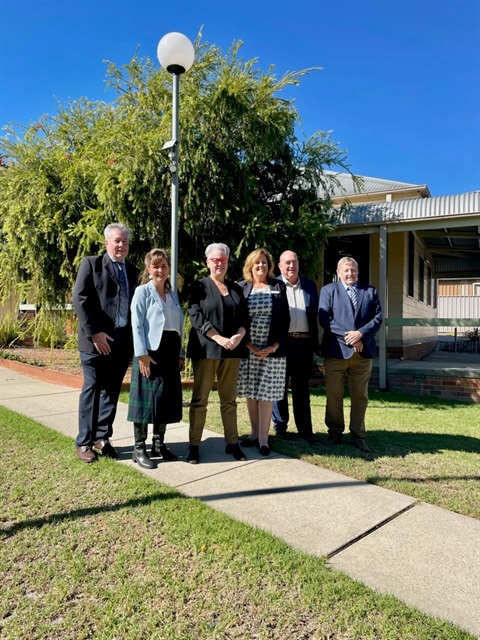HumeLink Host Councils Push for Community Benefit-Sharing Payments
Published on 06 May 2025

Councils in the Snowy Valleys, Upper Lachlan Shire, Yass Valley, Wagga Wagga City, and Cootamundra Gundagai Regional areas, have put forward a compelling advocacy proposal for community benefit-sharing payments related to Transgrid’s HumeLink project and other energy developments into the future.
This proposal aims to ensure that local communities hosting the transmission lines receive substantial and ongoing benefits.
On 2 May 2025, mayors of the host councils, Canberra Region Joint Organisation and Regional Development Australia representatives, met with the NSW Minister for Energy, Penny Sharpe to discuss the advocacy proposal.
“We are grateful to Minister Sharpe for her willingness to come to the region and listen to our mayors’ proposal for community benefit-sharing” said Cr Russell Fitzpatrick, Chair of the Canberra Region Joint Organisation.
The five councils propose to seek agreements with Transgrid to provide community benefit-sharing payments to councils, similar to payments made to landowners under the NSW Government's strategic benefit payments scheme.
Landowners are set to receive $10,000 per year (in 2022 dollars) for each kilometre of transmission lines to pass through their properties, for 20 years.
Councils are proposing a similar amount be paid to councils, to help pay for council-provided infrastructure and services, provide intergenerational benefit and leave a legacy for local host communities long after construction crews have pulled out.
The councils are also calling on the NSW Government to establish a community benefit-sharing payments scheme for developers of future transmission lines and energy projects in all areas of the state, building on state government work to ensure local benefits in renewable energy zones.
Transgrid has now received federal and state approvals for its HumeLink project, which involves constructing approximately 365 km of transmission lines across the five local government areas.
While Transgrid has a community partnerships program offering small grants and the HumeLink project has a community benefits and investment plan, these focus more on offsetting construction impacts rather than providing broad, long-term community benefits.
Unlike other developers and landholders who pay council rates, there is no requirement for Transgrid to make payments to councils to contribute towards long-term broader community benefits.
Cr Fitzpatrick said that “Minister Sharpe acknowledged the need for broad benefits to host communities. She encouraged the councils to continue working together to advocate to Transgrid for their communities and said she will do what she can to support that.”
“Minister Sharpe also committed to including the concept in the government’s considerations for how to ensure local benefits for host communities in areas outside of renewable energy zones.”
“She graciously thanked the five councils for their positive approach to the meeting and the advocacy proposal and expressed her willingness to continue discussions”.
The group of councils is determined in its advocacy for meaningful local community benefit-sharing agreements and schemes.
“What we want is for local host communities to directly share in the benefits from energy projects which deliver for national and statewide electricity consumers,” said Cr Fitzpatrick, “and we think that Transgrid and all operators of energy infrastructure should contribute to councils over the long-term to help achieve those local benefits.”
Contact:
For further information, please contact: Sharon Houlihan Executive Officer, Canberra Region Joint Organisation
Email: sharon.houlihan@crjo.nsw.gov.au Phone: 0427 469 156